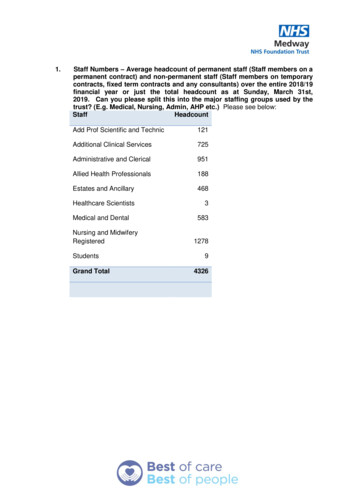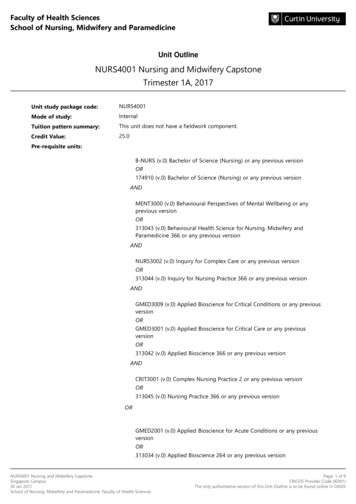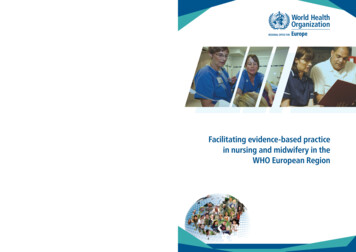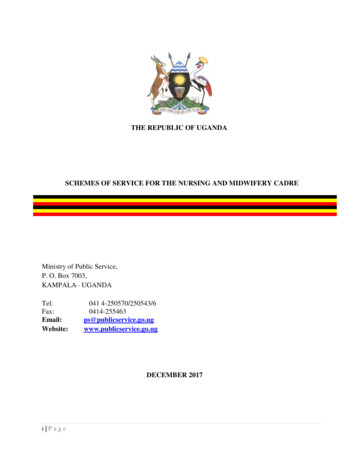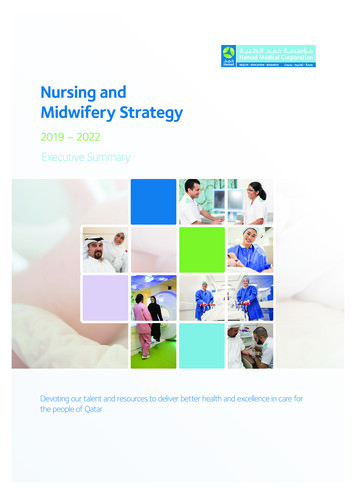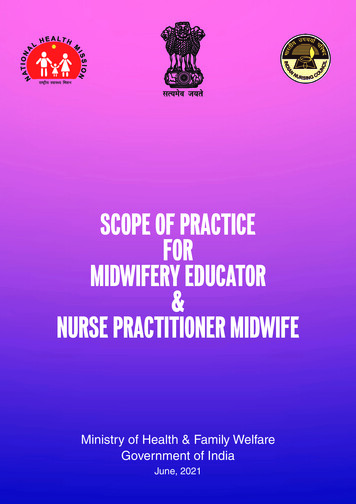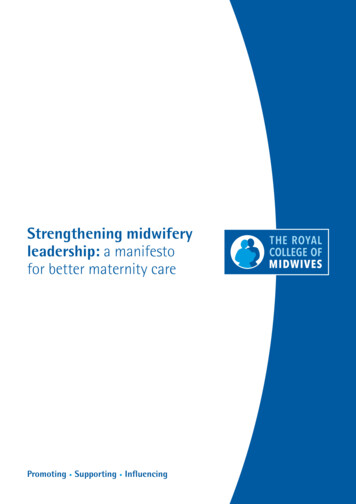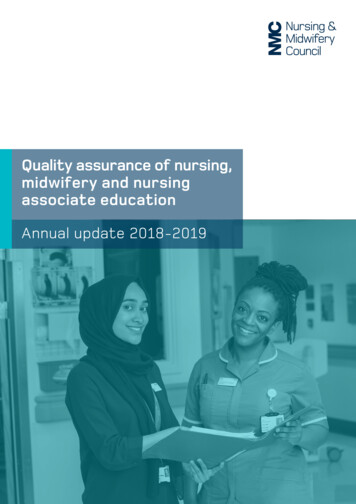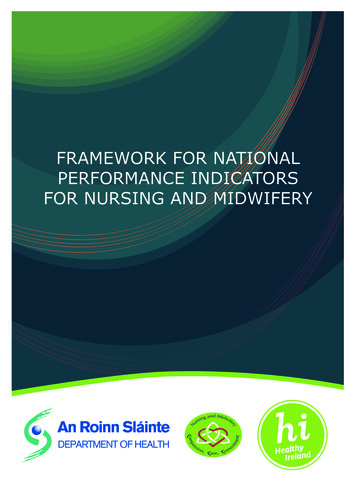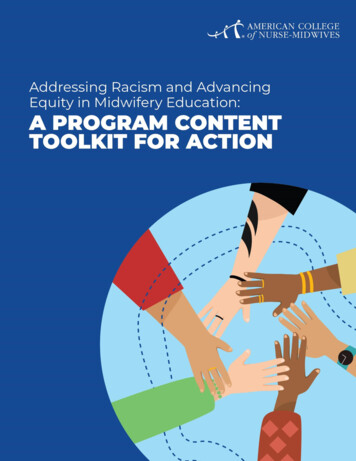
Transcription
SCHOOL OF NURSING, MIDWIFERY& PARAMEDIC PRACTICEBACHELOR OF SCIENCE (BSc)MIDWIFERYSTUDENT HANDBOOKINCORPORATING PRACTICE LEARNING HANDBOOKSeptember 20212021-22 version 1.1
Glossary of TermsShortened TermTerm in FullPSPractice SupervisorPAPractice AssessorAAAcademic AssessorPETPractice Education TeamPELPractice Education LecturerPLEPractice Learning Environment/ExperienceTripartiteA meeting between 3 people, usually the studentmidwife, practice supervisor, PEF or PEL or CHEFATL PracticeAcademic Team Lead Practice EducationPTPersonal TutorMPADMidwifery Practice Assessment DocumentPart 1Stage One*Part 2Stage Two*Part 3Stage Three** Parts 1, 2, and 3 refer to NMC terminology and correlate with eachacademic year of study. Within RGU these are defined as Stages.
Table of Contents1Welcome from the Head of School . 12Services & Facilities Available at RGU . 22.1Location . 22.2Helpful Links . 22.3Useful Contacts . 3RGU Union: Midwifery Society . 5General Information for Pre-registration Students . 52.4Academic Regulations . 52.5CampusMoodle . 62.6Career Information . 72.7Complaints Handling Procedure . 72.8Clinical Skills Centre . 72.9Communication . 82.10Course Information Database . 92.11Enrolment and Student Identification . 92.12International Students and Tier 4 Visas .102.13IT Facilities .112.14IT Helpdesk .112.15Storage of Student Files .122.16Jury Duty .122.17Module Teams .122.18MYRGU .132.19Personal Details and Student Records .14Changes to Personal Details .142.20Recording of Teaching and Learning Activities . 142.21Student Union .14
2.223Timetables .14Health, Safety and Welfare .153.1Accidents and Incidents .153.2Dentist .153.3Eating and Drinking within Teaching/Learning Areas . 153.4Equality and Diversity .163.5Fire .163.6First Aid .163.7General Practitioner (GP) .163.8Inclusion Advisory Service .17Inclusion Champions: School of Nursing, Midwiferyand Paramedic Practice .173.9Occupational Health Service .17Reasonable Adjustments .18Blood Borne Viruses (BBV) .183.10Personal/Lost Property .183.11Personal Safety .183.12Policies .19Alcohol/Drug Use .19Health and Safety .19Smoking .1943.13Student Wellbeing .193.14University Property .21BSc Midwifery Course .224.1Course Specification .224.2Personal Tutor.224.3Bursary .234.4Protection of Vulnerable Groups (PVG) .25
4.5CampusMoodle – Midwifery Study Area .264.6Mandatory Teaching Sessions .264.7Annual Leave .274.8Attendance and Absence .27University .28Practice .29Reporting Off Sick .29Reporting Fit to Return .30Certification: 1-7 days .30Certification: 8 days and over .30Tier 4 Students .314.9Make‐up Time Guidance .31Scope .31Purpose .32Procedure .324.10Time Out of the Course/Stepping On and Off the Course . 33Temporary Suspension of Studies (TSS) . 33Refer: Part time Course (RPT) .334.11Study Requirements .344.12Directed and Online Study .344.13Private Study .354.14Study Support .354.15Professional Requirements and Registration . 364.16Regulations .37RGU Academic Regulations .37NMC Regulations .384.17Fitness to Practise .38Knowledge .38
Skill .39Health .39Conduct .394.18Social Networking .404.19Progression and Progression Criteria .404.20References and Student Status Letters .414.21Student Representation and Partnership .414.22Unions for Student Midwives .42Professional Organisations, Trade Unions &Indemnity Insurance .42Royal College of Midwives (RCM).42Unison .434.235Registering Award with Nursing and Midwifery Council(NMC) .43Practice Learning Handbook .445.1Practice Experience .445.2Quality Management of the Practice Learning Environment(QMPLE) Mobile App .46Who is it for? .46Where can students download it? .46What does it do? .465.3Practice Learning Web Pages .475.4Care of Service Users.475.5Student Supervision and Assessment .47Practice Supervisor .48Practice Assessor .48Academic Assessor .48Additional Support .49Practice Learning Support Protocol .49
5.6Shift Patterns.495.7Residential Accommodation .505.8Confidentiality.505.9Involving People and Communities .515.10Escorting Service Users in Vehicles .525.11Attendance and Absence on PLE .525.12Dress Standards and Uniform .525.13Expenses .535.14Requirements prior to attending Practice LearningExperiences (PLEs) .53Letter of Authority.5465.15Midwifery Practice Assessment Document (MPAD) . 545.16Supernumerary Status .555.17Timesheets .565.18Pregnancy .56Assessment .576.1Assessment Overview .576.2Assessment Schedule .576.3Assessment Responsibilities .586.4Examinations .586.5Plagiarism .586.6Academic Integrity .586.7Support for Assessments .596.8Submission of Assessment .60Presentation of Coursework .60Midwifery Practice Assessment Document (MPAD) . 62Non‐Submission of coursework and non‐attendanceat examinations .626.9Turnitin Feedback Studio: Dropbox, Originality Report and
Feedback .636.10Fit to Sit Policy: Extenuating Circumstances . 656.11Extenuating Circumstances/Late Submission . 65Extenuating Circumstances .65Request for Extension to Specified Date ofSubmission .66Late Submission of Coursework .66Forms .666.12Extenuating Circumstances Panel .676.13Feedback on Assessment Performance .67Resubmission of Assessment .68Return of Assessment Documents .69786.14Number of Assessments .696.15University Grading Scheme.696.16Assessment Boards .706.17External Examiners .71Evaluation .727.1Overview.727.2Staff/Student Liaison Meetings .727.3National Student Survey .737.4NHS Education for Scotland (NES) Student Survey . 737.5Student Experience Questionnaire .737.6Practice Learning Experience (PLE) Evaluation . 74References.75Appendix 1: Student Visa Responsibilities
1 Welcome from the Head of SchoolIt gives me great pleasure to welcome you to the School of Nursing,Midwifery and Paramedic Practice as a student on the BSc Midwifery course.You are commencing your studies during a dynamic time for midwifery carepractice within the UK. One of the major challenges that faces theprofession is ensuring the quality of experience of women and their familiesduring pregnancy and childbirth; we are witnessing more midwifery led carewith all the challenges that come with living in both urban and remotesettings.This is the beginning of your journey to become a registered midwife and Ihope you settle into university life and enjoy your time with us. As part ofour commitment of support, you will be allocated a Personal Tutor, who willgive you advice and support throughout your course. In addition, we haveexcellent systems to support you whilst you are in the practice environmentwhere you will have an allocated Practice Supervisor/Assessor. Midwifery isan interesting, worthwhile but challenging profession, both academicallyand clinically.All staff in the School are committed to your success and we look forward toworking with you. We require and expect high standards from our studentsboth personally and professionally. You are expected to be committed andwork hard in order to achieve success, but you will also need to take thetime to enjoy your leisure time and overall student experience here at theRobert Gordon University. I do hope you enjoy your course, and are happywithin the university environment, if you have any questions or concernsplease do not hesitate to contact your Personal Tutor in the first instance.With regards,Professor Susan DawkesHead of School1
2 Services & Facilities Available at RGU2.1LocationThe RGU campus is based in the south side of the city at Garthdee. Mapscan be located ng/campus‐mapThe School of Nursing, Midwifery and Paramedic Practice is located withinthe Ishbel Gordon Building next to The Sir Ian Wood building.The entrance takes you into the 4th floor of the building; therefore, youtake the stairs or the lift up one floor to the School of Nursing, Midwiferyand Paramedic Practice.Within the School there are two reception areas; H510 and the Head ofSchool Reception. H510 is an important reception area for students andthere is an internal phone available within this area for students to contactstaff.There is also a small meeting room which members of staff can use to havebrief meetings with students. Students cannot access staff offices;therefore, H510 should always be your first port of call when you wish tomeet with a member of staff.2.2Helpful LinksTransport and Parking kingStudent reers and Employability Centrehttp://www.rgu.ac.uk/careersonmoodle2
Student Support including: Student Counselling & Wellbeing, MedicalServices, The Inclusion Centre: Disability and Dyslexia, Nursery Facilities,Chaplaincy, Study Support Serviceshttp://www.rgu.ac.uk/supportReport and Support: RGU’s online platform enabling anonymous or namedGender Based Violence disclosures and offering direct help in completeconfidence and detailed, specialist oud: An online resource to help mental Catering Facilitieshttps://www.rgu.ac.uk/cateringRGU e-Hub: the online and interactive careers information and resourcesplatform which includes specifically designed learning programmes and toolscovering all stages of the career planning, job search and applicationprocesshttp://www.rgu.ac.uk/ehubRGU Sporthttps://www.rgu.ac.uk/rgusportStudent Unionhttps://www.rgu.ac.uk/student-unionFinance and /www.rgu.ac.uk/library2.3Useful ContactsRole/Name/DepartmentContact DetailsHead of Schools.dawkes@rgu.ac.ukProfessor Susan Dawkes3
Role/Name/DepartmentContact DetailsAcademic Strategic Lead:heather.bain@rgu.ac.ukAcademic ProgrammesDr Heather BainAcademic Strategic Lead: Studentn.johnson@rgu.ac.ukExperience and EnhancementDr Neil JohnsonAcademic Team Lead Midwifery &f.gibb@rgu.ac.ukLead Midwife for EducationFiona GibbAcademic Team Lead: Practicei.fairley@rgu.ac.ukLearningIsla FairleyCourse Leader –s.humphrey3@rgu.ac.ukPre-registration midwifery01224 (26)2992Sarah HumphreySchool Administration Managerc.lauterbach@rgu.ac.ukChristine LauterbachPre-registration Administratormarina.veitch@rgu.ac.ukMarina Veitch01224 (26)2910Registry & Records Administratorj.yackiminie@rgu.ac.ukJulie YackiminieStudent Placement Administratorj.howatt@rgu.ac.ukJill HowattPractice Learning Experience (PLE)SNMPPlacements@rgu.ac.ukIssuesQueries regarding Jury Duty,SNMPRecords@rgu.ac.ukReferences, Student Status orTimesheetsReporting Sick LeaveSNMPAbsencereporting@rgu.ac.ukStudent ExpensesSNMPSchooloffice@rgu.ac.ukDanielle Campbell01224 (26)2974Uniform IssuesSNMPSchooloffice@rgu.ac.ukMaureen Cooper4
Role/Name/DepartmentContact Details01224 (26)2974Practice Education Lecturer (PEL)m.tabib-ghaffari1@rgu.ac.ukStage 101224 (26)2633Mo TabibPractice Education Lecturer (PEL)j.lironi@rgu.ac.ukStage 201224 (26)2991Jo LironiPractice Education Lecturer (PEL)a.lawrie1@rgu.ac.ukStage 301224 (26)2644Andrea LawrieLibrarylibrary@rgu.ac.uk01224 (26)3450CampusMoodle Helpdeskcampus@rgu.ac.uk01224 (26)2233IT Helpdeskithelpdesk@rgu.ac.uk01224 (26)2777RGU Union: Midwifery eties/7322/General Information for Pre-registration StudentsUseful information for your course is available from the followingCampusMoodle study area:NUS062 – General information2.4Academic RegulationsThe University's Academic Regulations apply to all educational provisionoffered by the University, which bears academic credit. The Regulationsdetail procedures covering aspects of the student experience such asstudent discipline (conduct), assessment and appeals against AssessmentBoard decisions.5
The University expects all students to act with honesty and integrity in theirstudies and your attention is drawn to the following page: AcademicHonesty @ RGU, which provides helpful guidance on this matter. Misconductis serious and any established misconduct can impact upon a student’sprogression, award and continuation of studies. The University hasprocesses to support students and in the event you are experiencingdifficulties with your studies then you are encouraged to contact yourPersonal Tutor or Course Leader.The Regulations are available in full via MYRGU under the ‘My Results’ tabor the following link: mpusMoodle is the virtual learning environment for RGU which providesan enhanced set of features to support the student’s learning. Each modulethat students study will have a study area on CampusMoodle. Tutors andlecturers will use this area to provide students with their module materialsand to communicate with them.There may also be discussion forums and other activities to allow studentsto communicate and collaborate with their fellow students. The onlineCampusMoodle User Guide for Students is available via the student’sCampusMoodle account. The link to CampusMoodle is below; students logon using their normal User ID and Password. If students have any queriesabout getting logged on, finding their modules or other issues, they shouldcontact the CampusMoodle Helpdesk.CampusMoodle dle Student User p?id 74257CampusMoodle Helpdesk:T: 01224 262233E: campus@rgu.ac.ukSee also CampusMoodle – Midwifery Study Area.6
2.6Career InformationThe University has developed an app which is a platform for interactivecareers information and resources. It includes specifically designed learningprogrammes and tools covering all stages of the career planning, job searchand application process. See: www.rgu.ac.uk/ehubAccess the following link on CampusMoodle for guidance which is specificallyfor nursing and midwifery dwifery2.7Complaints Handling ProcedureIf the student has any concerns or complaints, they should discuss thesewith their Personal Tutor/Course Leader in the first instance.The University has a complaints procedure which can be accessed at:http://www.rgu.ac.uk/complaints2.8Clinical Skills CentreThe Clinical Skills Centre is a state-of-the-art simulated learningenvironment comprising of two ward areas, a High Dependency Unit, a Childward area, a Labour room, a home setting and a general purpose room.The Clinical Skills Centre is located on Level 2 of the Ishbel Gordon Buildingand is used by all students. Student nurses, midwives and paramedics willuse the Clinical Skills Centre throughout their course to practice key clinicalskills, e.g. blood pressure measurement, basic life support andcommunication skills in this safe learning environment before going toclinical practice.The Clinical Skills Centre is equipped with a range of equipment to help tosimulate practice. We have several patient simulators including Meti man,SimMom (maternity mannequin) and Paediatric Hal so students will havethe opportunity to practise skills on a mannequin before they undertake theskills on a real person.7
Students will also work with members of the Patient Volunteer Programme.These volunteers are members of the public who will role play a scenario inthe Clinical Skills Centre to make it make it more realistic for students,rather than working with the mannequins all the time. For example, avolunteer will play the role of a confused person, a person in pain, a womanattending an antenatal clinic or a woman following the birth of her baby,and the student will be expected to ‘look after’ the volunteer. We also usevideo recording equipment in the Clinical Skills Centre to aid students’development and facilitate reflection on their clinical skills performance.Prior to using the Clinical Skills Centre, all students must familiarisethemselves with Topic 2: What’s expected of students? from the followingCampusMoodle study ?id 74209All students using the Clinical Skills Centre must adhere to the dress codeand wear a School of Nursing, Midwifery and Paramedic Practice polo shirt,black or navy comfortable trousers (preferably tracksuit bottoms) andtrainers. [Registered practitioners may wear their uniform from practice iftheir employer has agreed.]There are several pieces of equipment in the Clinical Skills Centre thatcontain latex. If the student is allergic to latex, they must inform theirPersonal Tutor at the start of the course and before attending the ClinicalSkills Centre.For more information about the Clinical Skills Centre, please access thefollowing mmunicationAll individual communication with students and staff at RGU will be throughthe student Outlook account. Students can expect a response from staffwithin 3 working days.Information relating to the course and modules will be posted on therelevant course or module study area on CampusMoodle. It is therefore8
important that students access their emails and relevant study areas onCampusMoodle on a regular basis.The University e‐mail is available at: http://mymail.rgu.ac.uk/Please note: When leaving a message on a member of staff’s voicemail, thestudent should remember to state their name, intake and provide a cleartelephone number.On campus, an internal phone is available in H510 for students to contact,or leave messages, for academic staff.2.10 Course Information DatabaseFurther information about the relevant course can be accessed from theCourse Information Database:http://www4.rgu.ac.uk/coursedb/Particular attention should be paid to the Course Specification (comprisingthe Core Award Data and Student Learning Experience) as these containvital information about the course.2.11 Enrolment and Student IdentificationAll students are required to enrol at the start of each Stage of their course.For NEW students a link to Enrol Online is provided in the RGYoU StudentPortal – Welcome page. Login details will be provided by Admissions inadvance of the start date of the course.Continuing students will receive an email, providing a link to Enrol Onlineeach time they need to re‐enrol. During the online enrolment registrationprocess, students will be required to confirm their personal details, includingtheir home (permanent) address and term‐time (contact) address, telephonenumbers, and course of study. At the end of online enrolment students willbe asked to accept the Terms and Conditions of the University. These areprovided below for reference.9
On joining a course, students will be assigned a unique matriculation numberwhich is required for access to services such as IT facilities and the Library.Students should make a careful note of this number. Students will also beissued with a Student ID card, which should be available for inspectionwhenever they are on University premises. Students should take care of thiscard and, in the event of loss, must Student Records and Information assoon as possible.If a student misses supported enrolment, they will be able to collect theircard from Student Help Point after these dates. If a card is lost or stolen thestudents should visit the Student Help Point who can issue them with a newone.Please note: if you do not have a crime reference number, there is a 10charge for this. Students must be aware that their student card is a validform of ID, and it is a criminal act to give this to another person to use.Further information can be obtained from:www.rgu.ac.uk/enrolmentStudent Records and Information:T: (01224) 262205E: enrol@rgu.ac.uk2.12 International Students and Tier 4 VisasThe University currently holds a Tier 4 Sponsor Licence on the Home OfficeUK Visas and Immigration (UKVI) Register.Both students and the University must comply with official Home Officerequirements under Tier 4 of the Points Based System. If students holdimmigration permission as a Tier 4 student, failure to comply with theserequirements can result in them being reported to the UKVI and could leadto their immigration permission being curtailed or cancelled.In order that the University retain current students and continue to acceptInternational Students in the future, it also has to comply with the terms ofits Tier 4 sponsor licence.10
A summary of responsibilities outlined in the Tier 4 policy guidance forstudents is set out in Appendix 1 of this handbook. Further information canbe obtained from the UKVI website at: www.gov.uk2.13 IT FacilitiesRGU provides modern up‐to‐date facilities for the benefit of the wholestudent body. Enrolled students can use student access computing facilitieson any of the University sites.These facilities are provided to support student education and training andprovide or supplement skills, which are now a part of everyday life.On enrolling for a course at RGU, students will be advised of the University’sPolicy on the use of IT Facilities. Breaching this policy could result indisciplinary actions ranging from withdrawal of access to computing facilitiesto dismissal from the University. Students at RGU can attend any openaccess labs, unless timetabled or restricted to specific departmentalstudents.The Policy for the use of IT Facilities and associated documentation can beaccessed from:www.rgu.ac.uk/policiesWhen accessing IT facilities within clinical areas, students should strictlyadhere to any policies governing their use.2.14 IT HelpdeskThe student’s first point of call for most computer related questions orproblems is the IT Helpdesk.http://www.rgu.ac.uk/it‐helpdeskT: 01224 262777E: ithelpdesk@rgu.ac.uk11
2.15 Storage of Student FilesStudents have a personal H drive with 5GB space which is backed up daily.It is recommended that students save ALL of their University files to their Hdrive as this is far more reliable than storing information on memory sticksand CDs. Students can access the H drive from Lab PCs, on campus or fromoff campus, via a suitable web-browser by visiting myapps.rgu.ac.uk.2.16 Jury DutyStudents are not exe
take the stairs or the lift up one floor to the School of Nursing, Midwifery and Paramedic Practice. Within the School there are two reception areas; H510 and the Head of School Reception. H510 is an important reception area for students and there is an internal phone available within this area for students to contact staff.
